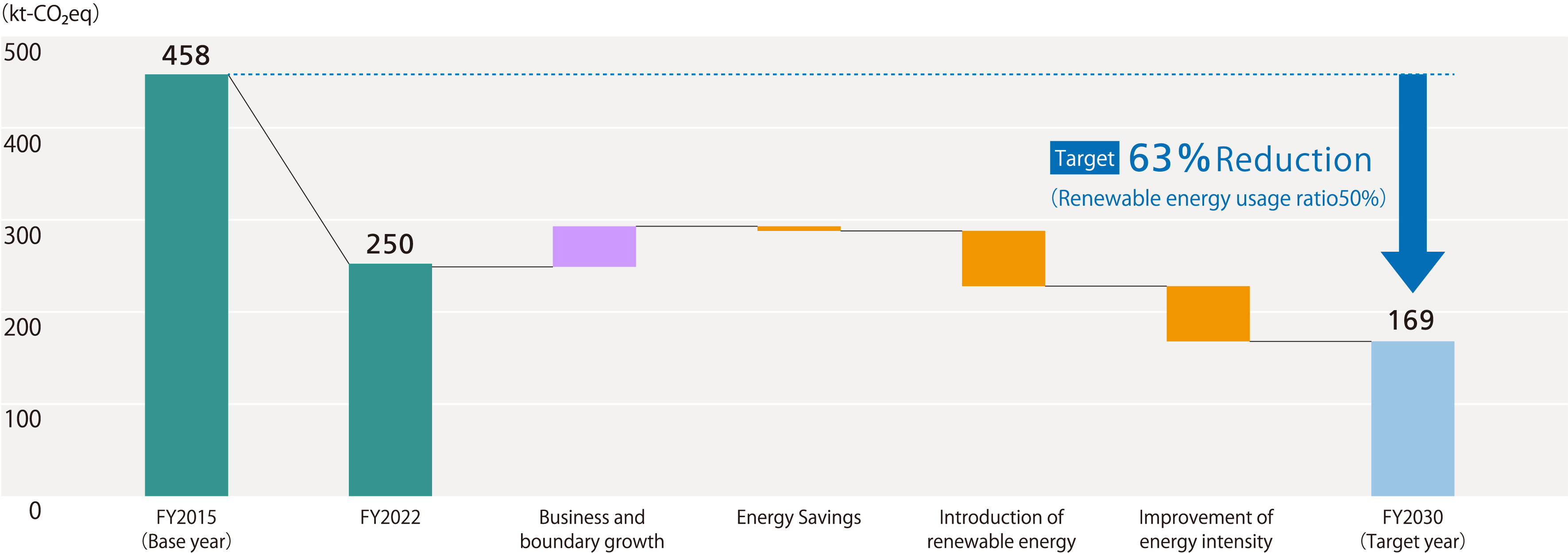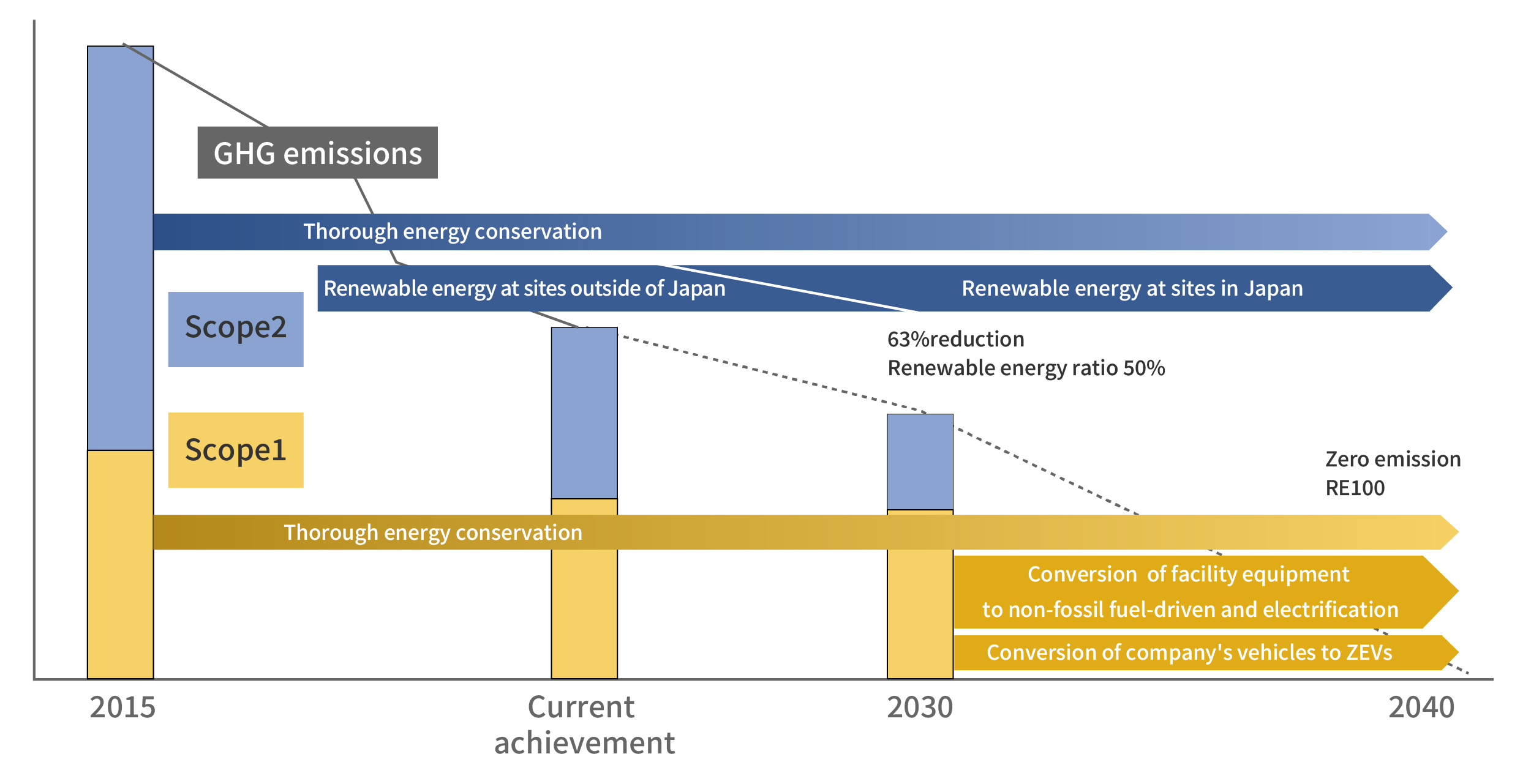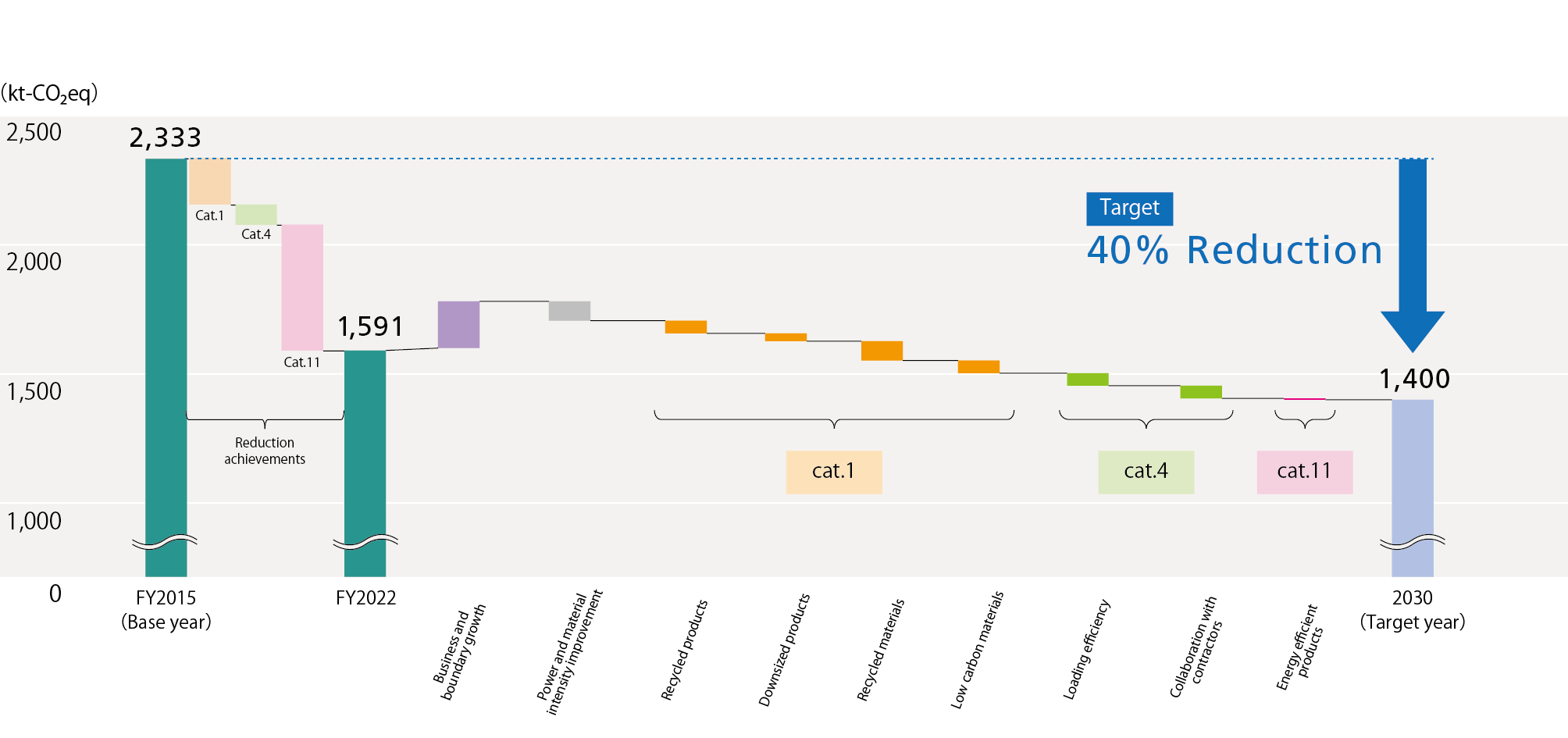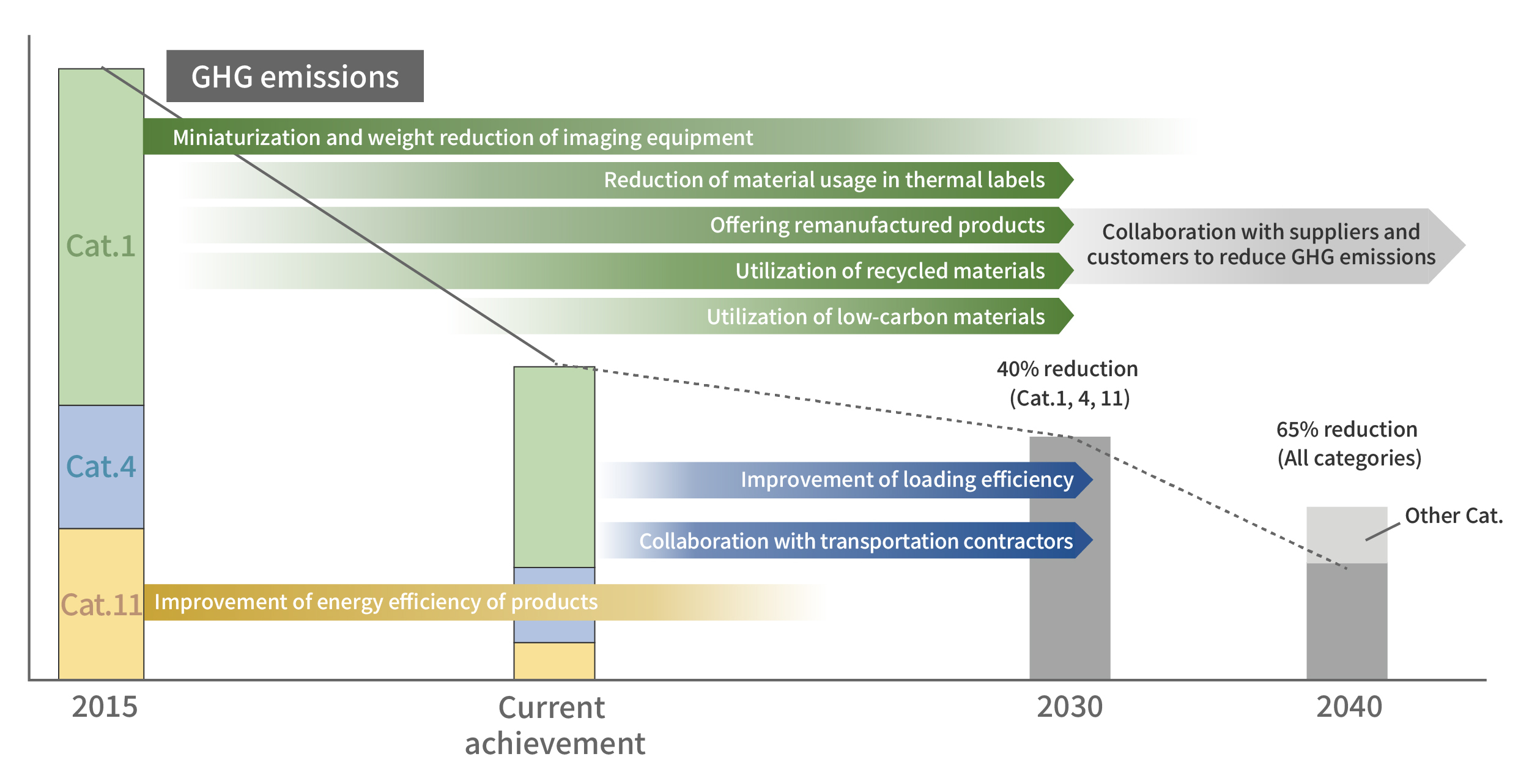
Climate Action
Policy/Basic Concept
“Climate change” is one of the most important social challenges which the global community is facing. The adverse effects of climate change are becoming more noticeable in many parts of the world and have become a serious issue influencing not only natural disasters, but also food production and economic security. Companies are expected to step up their efforts to decarbonize their operations in response to climate change. The Ricoh Group's concept of a sustainable society is expressed in the “Three Ps Balance,” which describes a society that maintains a balance among the three Ps: economy (Prosperity), society (People), and the global environment (Planet).
 Three Ps Balance
Three Ps Balance
Based on the Ricoh Group Environmental Declaration, which states “We proactively reduce environmental impact and strive to improve the Earth’s self-recovery capabilities to achieve a zero-carbon society and a circular economy through business.” we have positioned the realization of a decarbonized society as one of our materiality issues in the global environment field. We are engaged in activities to reduce our GHG emissions to achieve the targets for reducing GHG emissions established through back casting, while respecting scientific findings such as those of the IPCC and international agreements like the Paris Agreement.
Decarbonization Policy
1.Conserve energy and switch to alternative fuels.
2.Harness renewable energy.
3.Identify and reduce GHG emissions in the supply chain.
For details of Ricoh group's climate change activities, please refer to the following report.
 Ricoh Group Environmental Report
Ricoh Group Environmental Report
Structures/Systems
To continuously discuss mid- to long-term issues of the Ricoh Group in the areas of environment, society, and governance at the management level, the ESG Committee, chaired by the CEO, was established in May 2018. The committee meets once every quarter with the participation of Senior Management to discuss the status of initiatives, issues, and investment decisions related to ESG themes, such as zero carbonization, as important themes for management. Its deliberations are regularly reported to the Board of Directors, which then supervises the execution of ESG activities at a high level.
In addition, we set a target for reducing GHG emissions as one of the companywide ESG targets established as part of our mid-term management strategy, and at the same time, we set a target for reducing GHG emissions for each business unit, for which we conduct forecast and performance management for each business year. We analyze environmental performance data compiled by our cloud system for our approximately 900 global sites and use this data for PDCA management.
Targets and Performance
The Ricoh Group aims to achieve net zero GHG emissions by 2050. 2040 goals are net zero GHG emissions in Scope 1 and 2, and a 100% renewable energy ratio for the electricity used in our business activities. Moreover we have obtained SBT 1.5°C certification for our 2030 target, which is consistent with the level required to limit the rise in global temperature to less than 1.5°C in Scope 1, 2, and 3.
Ricoh Group environmental goals (zero-carbon)
Goals for 2050
- GHG Scope 1*1, 2*2, 3*3 : Net zero GHG emissions (90% reduction compared to 2015 level, residual emissions are offset via internationally acceptable methods*4)
Goals for 2040
- GHG Scope1,2 : Zero emission (90% reduction compared to 2015 level, residual emissions are offset via internationally acceptable methods)
- GHG Scope3 : (65% reduction compared to 2015 level, all categories)
- Renewable energy usage ratio: 100%
Goals for 2030
- GHG Scope1 and 2: 63% reduction (compared to 2015 level)
- GHG Scope3 : 40% reduction (compared to 2015 level, procurement/ transportation/use categories)
- Renewable energy usage ratio: 50%
*1 GHG Scope 1: All direct GHG emissions from our manufacturing plants, offices, vehicles, etc.
*2 GHG Scope 2: Indirect GHG emissions from the consumption of electricity and heat that we purchase
*3 GHG Scope 3:Emissions in the supply chain from business activities (procurement, transportation and use categories)
*4 In accordance with ISO 14068-1:2023, published in November 2023

GHG Scope 1 and 2 reduction
Harness renewable energy
- Purchase of renewable energy
- In-house renewable energy power generation
- Introduction of PPA contracts
- Strategic utilization of renewable energy certificates
Conserve energy and switch to alternative fuels
- Innovation of production and business processes
- Installation of highly efficient and energy saving equipment
- Electrification of production process and fuel conversion
- Promotion of Net Zero Energy Buildings
- Operational innovation of corporate fleet vehicles and electrification
GHG Scope 3 reduction
Decarbonization in the supply chain
- Zero-emission material procurement
- Development of energy-saving equipment, introduction of renewable energy by customers
- Use of non-fossil fuel-based transportation
- Use of non-fossil fuel-based services
GHG Scope 1 and 2 reduction
Active and effective use of renewable energy
- Purchase of renewable energy
- In-house renewable energy power generation
- Introduction of PPA contracts
- Strategic utilization of renewable energy certificates
Energy saving and fuel conversion
- Innovation of production and business processes
- Installation of highly efficient and energy saving equipment
- Electrification of production process and fuel conversion
- Promotion of Net Zero Energy Buildings
- Operational innovation of corporate fleet vehicles and electrification
GHG Scope 3 reduction
Decarbonization in the supply chain
- Zero-emission material procurement
- Development of energy-saving equipment, introduction of renewable energy by customers
- Use of non-fossil fuel-based transportation
- Use of non-fossil fuel-based services
| Performance |
GHG Scope 1,2
GHG Scope 3
Electric power
*Due to changes to the Ricoh Group's organizational structure and improved data accuracy, we revised the past data Road Map for Zero-Carbon Society to Achieve 2030 Targets2030 Scope 1, 2: Initiatives and plans to achieve 63% reductionActive use of renewable energy Promoting energy saving activities <Expected reduction by activity towards FY2030 (starting from FY2022 when the target was established)> *The figures in diagram below are based on fiscal year 2022 when the target was set, and revisions to past year's emissions due to subsequent organizational changes within the Ricoh Group are not reflected. 
<Scope 1 and 2 Reduction Roadmap> 
2030 Scope 3: Initiatives and Plans for 40% ReductionWe will work together with the entire value chain, including suppliers, customers, and transportation contractors, to achieve a Scope 3 reduction. *The figures in diagram below are based on fiscal year 2022 when the target was set, and revisions to past year's emissions due to subsequent organizational changes within the Ricoh Group are not reflected. Scope3 reduction scenario for 2030 <Expected reduction by activity towards FY2030 (starting from FY2022 when the target was established)> *The figures in diagram below are based on fiscal year 2022 when the target was set, and revisions to past year's emissions due to subsequent organizational changes within the Ricoh Group are not reflected. 
<Scope 3 Reduction Roadmap> 
Avoided emissionsThe Ricoh Group calculates the GHG emissions (Scope 1, 2 and 3) from its own business activities and sets environmental targets to reduce these emissions. On the other hand, GHG emissions increase with business growth and entry into new businesses. However, for example, society's GHG emissions can be reduced by improving the energy-saving performance of newly developed MFPs, reducing their power consumption and replacing older models, and the digital printing presses that Ricoh is aiming to expand sales of meet the market needs for high-mix, low-volume lots, and can save resources and energy by reducing inventory compared to conventional offset printing presses, resulting in a reduced environmental impact on society as a whole. Thus, the greenhouse gases reduced in society by Ricoh's products and solutions are referred to as "Avoided Emissions". Target:1,400 kt-CO2eq (End of FY2025)
For other achievements related to realizing a Zero-Carbon Society, please see below.  ESG data.
ESG data.
Initiatives
Initiatives for Scope 1 and 2 emissions reduction
【Conserve energy and switch to alternative fuels 】
Initiatives for Scope 3 emissions reduction

| ||||||||||||||||||||||||||||||||||||||||||||||||||||||||||||||||||||||||||||
|---|---|---|---|---|---|---|---|---|---|---|---|---|---|---|---|---|---|---|---|---|---|---|---|---|---|---|---|---|---|---|---|---|---|---|---|---|---|---|---|---|---|---|---|---|---|---|---|---|---|---|---|---|---|---|---|---|---|---|---|---|---|---|---|---|---|---|---|---|---|---|---|---|---|---|---|---|---|